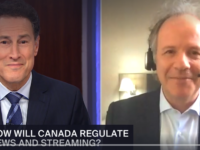Parliament remains on break for most of the month of January, but that hasn’t cooled interest in Bills C-11 and C-18. I’ve appeared on several podcasts in recent weeks on these bills that may interest. Last week, I was pleased to appear on CBC’s Front Burner for an episode titled “Will Canada Make Web Giants Pay For News?”. The discussion with host Jayme Poisson focused on the implications of paying for links, the inclusion of the CBC in the system, and potential alternatives that would mitigate against the harms created by the bill.
Post Tagged with: "c-11"
The Law Bytes Podcast, Episode 151: The Year in Canadian Digital Law and Policy and What Lies Ahead in 2023
Canadian digital law and policy in 2022 was marked by legislative battles over Bills C-11 and C-18, the Rogers outage, stalled privacy and AI reform, copyright term extension, and a growing trade battle with the U.S. over Canadian policies. For this final Law Bytes podcast of 2022, I go solo without a guest to talk about the most significant trends and developments in Canadian digital policy from the past year and to think a bit about what may lie ahead in 2023.
Senate Committee Completes Its Review of Bill C-11: What Comes Next?
The Senate Standing Committee on Transport and Communications completed its extensive review of Bill C-11 last week. After a review for grammatical, editorial, and translation issues, the committee is expected to finalize its report back to the Senate later today. While the next steps for Bill C-11 remain somewhat uncertain, the committee should be congratulated for providing a model for legislative review. Indeed, the Senate committee was everything the House committee was not: policy focused, open to hearing from a wide range of witnesses, and willing to engage in meaningful debate on potential amendments. Politics occasionally arose during the clause-by-clause review, but political considerations were never going to be entirely stripped from a highly politicized piece of legislation.
I may have missed the odd change, but the following amendments were approved by the committee:
The Law Bytes Podcast, Episode 150: How Will Canada Regulate News and Streaming – My Appearance on TVO’s The Agenda
The government’s two big Internet bills – Bill C-11 and Bill C-18, both made significant advances late last week. The Senate Transport and Communications committee concluded months of hearings on Bill C-11 by agreeing to about 25 amendments, notably including a change to the scope of user content regulation that is designed to limit the application to sound recordings as well as the removal of a provision that critics feared would limit CRTC independence. Meanwhile in the House, Bill C-18 cleared the Canadian Heritage committee with changes that invite legal challenges and make a showdown over blocking news content increasingly likely.
Just prior to these committee meetings, I appeared on TVO’s the Agenda with Steve Paikin to discuss the bills and why they matter. The interview elicited very positive feedback and with the kind permission of TVO and the Agenda, I’m pleased to provide the audio version of that interview as this week’s Law Bytes podcast.
Scoping User Content Out of Bill C-11: Senate Committee Makes Much-Needed Change, But Will the Government Accept It?
The widespread concern over Bill C-11 has largely focused on the potential CRTC regulation of user content. Despite repeated assurances from the government that “users are out, platforms are in”, the reality is that the bill kept the door open to regulating such content. The language in the bill is clear: Section 4.2 grants the CRTC the power to establish regulations on programs (which includes audio and audiovisual content by users). The provision identifies three considerations for the Commission, most notably if the program “directly or indirectly generates revenues.” The revenue generation provision is what led many digital creators to argue they were caught by the bill and for TikTok to conclude that any video with music would also fall within the ambit of the legislation.
The Senate Standing Committee on Transport and Communications, which has conducted months of hearings on Bill C-11, was clearly convinced that the user content issue needed to be addressed. Last night (hours after the ill-advised addition of age verification to the bill), it agreed on an amendment that, with two key caveats, goes a long way to scoping out user content regulation.











